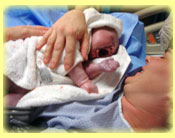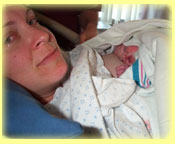|
What is a Doula?
Why Have a Doula?
Dads and Doulas
Doulas and VBAC
What is a Doula?
The term "birth doula" is used to refer to someone trained and experienced in childbirth who provides continuous physical, emotional, and informational support to the mother and her partner before, during, and just after childbirth.
 A doula provides assistance in gathering information about your care during pregnancy and childbirth. During pregnancy, a doula will help you and your partner consider options for childbirth, and help develop your set of "birth wishes" for the delivery of your child. During labor, a doula will provide emotional support and reassurance, physical support (comfort measures, relaxation techniques), and ideas to help with baby's position and labor progress. A doula provides assistance in gathering information about your care during pregnancy and childbirth. During pregnancy, a doula will help you and your partner consider options for childbirth, and help develop your set of "birth wishes" for the delivery of your child. During labor, a doula will provide emotional support and reassurance, physical support (comfort measures, relaxation techniques), and ideas to help with baby's position and labor progress.
Doulas will provide support in the initial days and weeks postpartum by reviewing your birth experience, answering any questions about caring for and feeding your baby, and making sure you and your new family have the support you need to succeed in your new roles.
Postpartum doulas are also available to help after the baby is born. A postpartum doula is available in your home for the weeks following the birth of your child, and helps with newborn care and breastfeeding, household chores, cleaning, cooking, and care of older siblings while you focus on caring for your baby and yourself. For information on postpartum doulas, please check your local listings or visit the DONA web site for a listing of doulas in your area.
Back to Top
Why Have a Doula?
Childbirth is a very emotionally charged event, and nobody knows exactly what labor will be like, even if they have given birth before. Having someone there who is experienced in childbirth can be comforting. A doula recognizes the physical and emotional aspects of labor, and provides reassurance and help with comfort measures.
 Doulas are beneficial not only during an unmedicated birth, but during a medicated birth as well. Some mothers may want to reach a certain point in their labor before receiving medication. Others may have emotional hurdles to conquer or previous difficult labors. In the case of a planned cesarean, mothers and partners may need assistance coping with surgery. A doula can also be a companion when a loved one is unable to attend the delivery. Doulas are beneficial not only during an unmedicated birth, but during a medicated birth as well. Some mothers may want to reach a certain point in their labor before receiving medication. Others may have emotional hurdles to conquer or previous difficult labors. In the case of a planned cesarean, mothers and partners may need assistance coping with surgery. A doula can also be a companion when a loved one is unable to attend the delivery.
While nurses, midwives, and doctors can be supportive and are very necessary for providing medical care during childbirth, they have many other responsibilities and are most likely not able to spend a lot of time with you during childbirth. A doula will meet you in early labor and provide continuous support throughout your labor. Also, while medical staff are focused on your physical health and well-being, a doula is focused on your comfort level and emotional state. Both levels of support are important during labor.
Statistically speaking, doulas provide a significant benefit with respect to overall outcomes. Having a doula present has been shown to result in:
- Reduced cesarean rates
- Shorter labors
- Fewer requests for pain medication and epidurals
- Less need for Pitocin to speed up labor
- Reduced need for forceps during delivery**
Doulas have been shown to result in mothers having greater satisfaction with their birth experience, more positive assessments of their babies, and less postpartum depression. The presence of a doula also results in shorter hospital stays and fewer admissions to special care nurseries for babies, babies who breastfeed more easily, and mothers showing more affection toward their babies postpartum.**
**Source: DONA International
Back to Top
Dads and Doulas
Today many childbirth classes emphasize the role of the partner as coach, suggesting they educate themselves on how to help labor progress or help the mother cope with pain. This may be a lot to expect, especially if your partner has not been through the childbirth experience before. It is an emotionally charged event for him (or her) as well.
A doula can help remind you and your partner of things learned in class, and provide assistance with comfort measures. A doula is not present to replace your partner — rather, she is there to work together with him in order to support you. In some cases this might mean a very hands-on role for the doula. In others, the doula may simply provide direction and guidance and the partner takes a more hands-on role. The level of participation will be based on information discussed together prenatally. Even if your partner is not comfortable with providing physical support and reassurance, a doula can never replace the loving support he provides to the mother.
Back to Top
Doulas and VBAC
Doulas can be especially beneficial for the mother planning a VBAC (vaginal birth after cesarean). Prior to and during a VBAC labor, a mother may experience a variety of emotions, particularly when she reaches the point in her labor when her cesarean section was decided upon previously. A doula can provide a lot of needed reassurance during this time.
During pregnancy, a mother planning a VBAC will need to make sure she selects a supportive care provider and does a lot of her own research along the way. A doula can help her interpret the information she reads and receives from her doctor, as well as help her make sense of the varied and fluctuating opinions on this hot topic.
For information and resources to help with the decision to plan a VBAC, please visit the Resources page.
Back to Top
|

 A doula provides assistance in gathering information about your care during pregnancy and childbirth. During pregnancy, a doula will help you and your partner consider options for childbirth, and help develop your set of "birth wishes" for the delivery of your child. During labor, a doula will provide emotional support and reassurance, physical support (comfort measures, relaxation techniques), and ideas to help with baby's position and labor progress.
A doula provides assistance in gathering information about your care during pregnancy and childbirth. During pregnancy, a doula will help you and your partner consider options for childbirth, and help develop your set of "birth wishes" for the delivery of your child. During labor, a doula will provide emotional support and reassurance, physical support (comfort measures, relaxation techniques), and ideas to help with baby's position and labor progress. Doulas are beneficial not only during an unmedicated birth, but during a medicated birth as well. Some mothers may want to reach a certain point in their labor before receiving medication. Others may have emotional hurdles to conquer or previous difficult labors. In the case of a planned cesarean, mothers and partners may need assistance coping with surgery. A doula can also be a companion when a loved one is unable to attend the delivery.
Doulas are beneficial not only during an unmedicated birth, but during a medicated birth as well. Some mothers may want to reach a certain point in their labor before receiving medication. Others may have emotional hurdles to conquer or previous difficult labors. In the case of a planned cesarean, mothers and partners may need assistance coping with surgery. A doula can also be a companion when a loved one is unable to attend the delivery.